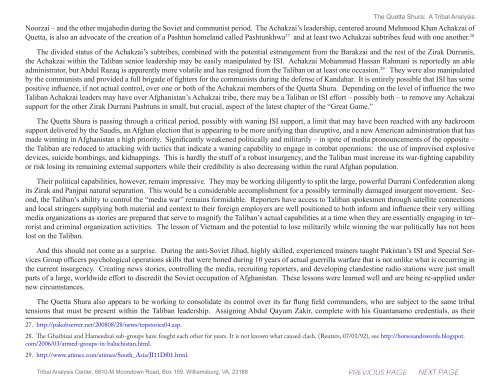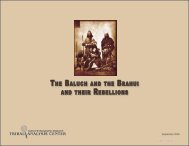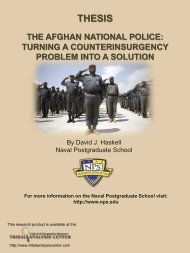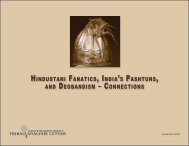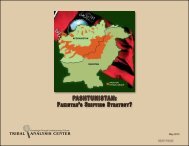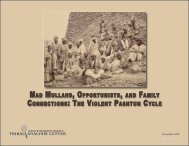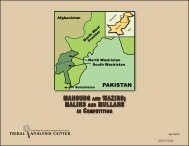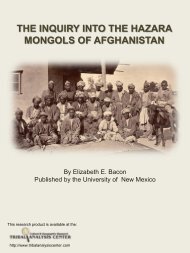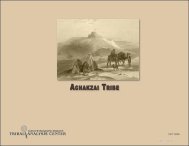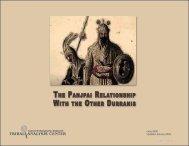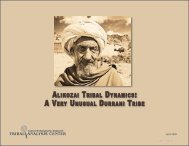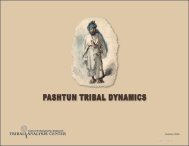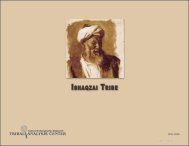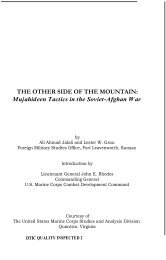THE QUETTA SHURA: A TRIBAL ANALYSIS - Tribal Analysis Center
THE QUETTA SHURA: A TRIBAL ANALYSIS - Tribal Analysis Center
THE QUETTA SHURA: A TRIBAL ANALYSIS - Tribal Analysis Center
Create successful ePaper yourself
Turn your PDF publications into a flip-book with our unique Google optimized e-Paper software.
The Quetta Shura: A <strong>Tribal</strong> <strong>Analysis</strong>Noorzai – and the other mujahedin during the Soviet and communist period. The Achakzai’s leadership, centered around Mehmood Khan Achakzai ofQuetta, is also an advocate of the creation of a Pashtun homeland called Pashtunkhwa 27 and at least two Achakzai subtribes feud with one another. 28The divided status of the Achakzai’s subtribes, combined with the potential estrangement from the Barakzai and the rest of the Zirak Durranis,the Achakzai within the Taliban senior leadership may be easily manipulated by ISI. Achakzai Mohammad Hassan Rahmani is reportedly an ableadministrator, but Abdul Razaq is apparently more volatile and has resigned from the Taliban on at least one occasion. 29 They were also manipulatedby the communists and provided a full brigade of fighters for the communists during the defense of Kandahar. It is entirely possible that ISI has somepositive influence, if not actual control, over one or both of the Achakzai members of the Quetta Shura. Depending on the level of influence the twoTaliban Achakzai leaders may have over Afghanistan’s Achakzai tribe, there may be a Taliban or ISI effort – possibly both – to remove any Achakzaisupport for the other Zirak Durrani Pashtuns in small, but crucial, aspect of the latest chapter of the “Great Game.”The Quetta Shura is passing through a critical period, possibly with waning ISI support, a limit that may have been reached with any backroomsupport delivered by the Saudis, an Afghan election that is appearing to be more unifying than disruptive, and a new American administration that hasmade winning in Afghanistan a high priority. Significantly weakened politically and militarily – in spite of media pronouncements of the opposite –the Taliban are reduced to attacking with tactics that indicate a waning capability to engage in combat operations: the use of improvised explosivedevices, suicide bombings, and kidnappings. This is hardly the stuff of a robust insurgency, and the Taliban must increase its war-fighting capabilityor risk losing its remaining external supporters while their credibility is also decreasing within the rural Afghan population.Their political capabilities, however, remain impressive. They may be working diligently to split the large, powerful Durrani Confederation alongits Zirak and Panjpai natural separation. This would be a considerable accomplishment for a possibly terminally damaged insurgent movement. Second,the Taliban’s ability to control the “media war” remains formidable. Reporters have access to Taliban spokesmen through satellite connectionsand local stringers supplying both material and context to their foreign employers are well positioned to both inform and influence their very willingmedia organizations as stories are prepared that serve to magnify the Taliban’s actual capabilities at a time when they are essentially engaging in terroristand criminal organization activities. The lesson of Vietnam and the potential to lose militarily while winning the war politically has not beenlost on the Taliban.And this should not come as a surprise. During the anti-Soviet Jihad, highly skilled, experienced trainers taught Pakistan’s ISI and Special ServicesGroup officers psychological operations skills that were honed during 10 years of actual guerrilla warfare that is not unlike what is occurring inthe current insurgency. Creating news stories, controlling the media, recruiting reporters, and developing clandestine radio stations were just smallparts of a large, worldwide effort to discredit the Soviet occupation of Afghanistan. These lessons were learned well and are being re-applied undernew circumstances.The Quetta Shura also appears to be working to consolidate its control over its far flung field commanders, who are subject to the same tribaltensions that must be present within the Taliban leadership. Assigning Abdul Qayum Zakir, complete with his Guantanamo credentials, as their27. http://pakobserver.net/200808/28/news/topstories04.asp.28. The Ghaibizai and Hameedzai sub-groups have fought each other for years. It is not known what caused clash. (Reuters, 07/01/92), see http://horsesandswords.blogspot.com/2006/03/armed-groups-in-baluchistan.html.29. http://www.atimes.com/atimes/South_Asia/JI11Df01.html.<strong>Tribal</strong> <strong>Analysis</strong> <strong>Center</strong>, 6610-M Mooretown Road, Box 159. Williamsburg, VA, 23188


